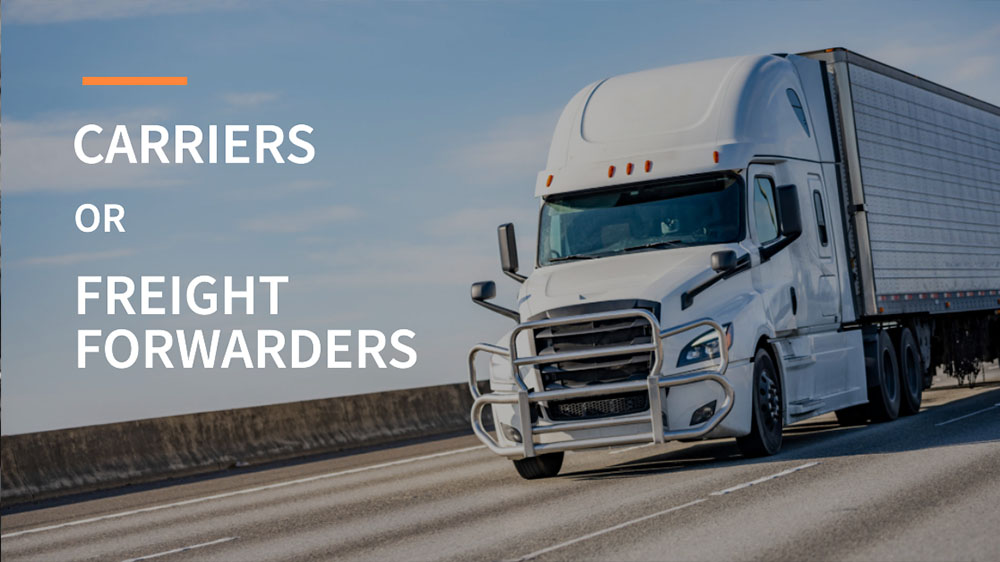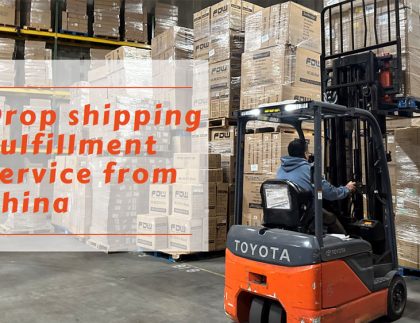Carrier vs. Freight Forwarder: Choosing the Right Fit for Your International Business
Carrier vs. Freight Forwarder: How to choose the Right Fit for Your International Business?

In the complex world of logistics, it’s crucial to understand the roles and functions of carriers and freight forwarders.
Both play vital roles in the transportation of goods, but they offer distinct advantages depending on specific requirements.
This article aims to shed light on the definitions, advantages, differences, and considerations when choosing between carriers and freight forwarders.
Table of Contents
Definition of a Carrier in Logistics

A carrier is a transportation company that directly handles the physical movement of goods from one location to another.
Carriers can be trucking companies providing FTL and LTL services, airlines, shipping lines, or railway operators. They own or lease the transportation equipment and are responsible for the safe and efficient delivery of goods to their destination.
Advantages of Carriers compared to Freight Forwarders
Direct Control
Carriers have complete control over the transportation process, allowing for greater reliability and visibility. Since they handle the physical movement of goods, they can ensure that the shipment progresses smoothly and address any issues that may arise promptly.
Cost Efficiency
By eliminating the intermediary role, carriers can often offer competitive pricing for transportation services.
Directly engaging carriers can be cost-effective, especially for high-volume shipments, as it eliminates additional fees associated with using a freight forwarder.
Specialization
Carriers often specialize in specific modes of transportation, allowing for tailored solutions based on unique shipping requirements.
Whether it’s trucking, air freight, ocean freight, or rail transportation, carriers have expertise in their respective fields and can provide optimized logistics solutions.
Determining when to use a Carrier
High Volume, Low Complexity
When shipping large quantities of goods with straightforward logistics requirements, using a carrier can be more cost-effective and efficient.
Carriers are well-equipped to handle bulk shipments and can offer competitive rates for such volumes.
Need for Direct Control
If maintaining control over the transportation process is crucial, opting for a carrier ensures direct oversight and accountability. This is particularly important when dealing with sensitive or high-value goods where security and visibility are paramount.
Definition of a Freight Forwarder in Logistics

A freight forwarder is a company that acts as an intermediary between the shipper and various carriers, coordinating and managing the logistics aspects of shipping.
Freight forwarders handle documentation, arrange transportation services, and provide value-added services such as customs clearance, insurance and warehousing.
Advantages of Freight Forwarders compared to Carriers
Expertise and Experience
Freight forwarders possess in-depth knowledge of international shipping regulations, customs procedures, and documentation requirements.
They are well-versed in navigating the complexities of global logistics and can ensure compliance with all necessary rules and regulations.
Multimodal Solutions
Freight forwarders have the flexibility to arrange transportation across various modes (e.g., air, sea, road, rail) to optimize cost and efficiency.
They can assess the specific requirements of a shipment and select the most appropriate carriers for each leg of the journey, providing comprehensive multimodal solutions.
Value-added Services
Beyond transportation, freight forwarders can offer services like warehousing, end-to-end solution, packaging, and insurance, providing direct-to-consumer (DTC) shipping.
They can handle customs clearance, ensuring smooth passage of goods through borders, and offer additional services that streamline the shipping process.
Determining when to use a Freight Forwarder
International Shipments
When shipping goods across borders, freight forwarders can navigate complex customs processes and ensure compliance.
They have expertise in international regulations and can handle the necessary documentation, reducing the risk of delays or penalties. Especially when it comes to peak season, freight forwarder is more flexible to face the changes in this special period.
Complex Logistics
For shipments involving multiple modes of transportation or requiring additional services, freight forwarders streamline the process and provide comprehensive solutions.
They have established networks and partnerships with carriers, warehouses, and other service providers, making them adept at managing complex logistics scenarios. They basically can provide all the services included in Incoterms.
The Differences between a Carrier and a Freight Forwarder
Roles
Carrier: Focuses on physical transportation, owning or leasing the necessary transportation equipment. Their primary responsibility is to ensure the safe and efficient delivery of goods to the designated destination.
Freight Forwarder: Acts as a middleman, coordinating and managing the logistics aspects of shipping. They arrange transportation services with carriers, handle documentation, and provide value-added services to facilitate smooth cargo movement.
Scope of Service
Carrier: Primarily handles the physical movement of goods. They are responsible for loading, transporting, and unloading shipments while ensuring compliance with safety regulations.
Freight Forwarder: Provides a range of services, including transportation coordination, documentation, customs clearance, and value-added services. They oversee the entire shipping process, ensuring seamless logistics management from origin to destination.
Control
Carrier: Maintains direct control over the transportation process. They have visibility into the movement of goods, allowing for prompt intervention in case of any disruptions or delays.
Freight Forwarder: Relies on partnerships with carriers while offering oversight and coordination. They act as the main point of contact for the shipper, providing updates and managing the logistics chain.
Can the Same Company Act as a Carrier and a Freight Forwarder?
The anwser is yes, it is possible for a company to act as both a carrier and a freight forwarder. Some logistics providers offer integrated services, combining the roles of carrier and freight forwarder.
This allows for seamless coordination and comprehensive solutions tailored to specific shipping needs. Such companies can provide end-to-end logistics support, handling both the physical transportation and the associated documentation and value-added services.
Carrier vs. Freight Forwarder: Which to Choose?
Choosing between a carrier and a freight forwarder depends on several factors, including the nature of the shipment, logistical complexity, and desired level of control.
Choose a Carrier When:
- Shipping large volumes with straightforward logistics requirements.
- Direct control and visibility are crucial.
- Cost efficiency is a priority.
Choose a Freight Forwarder When:
- Shipping internationally with complex customs processes.
- Multimodal transportation solutions are required.
- Value-added services such as customs clearance, insurance, and warehousing are needed.
DIDADI is a trusted and leading freight forwarder that offers comprehensive order fulfillment solutions for e-commerce businesses. We specialize in warehousing, inventory management, picking, packing, shipping, and returns management.
With advanced technology, robust infrastructure, and a customer-centric approach, DIDADI ensures accurate and timely order fulfillment.
We also provide scalable solutions that cater to businesses of all sizes, allowing seamless expansion as your operations grow. DIDADI’s commitment to transparency, performance metrics, and exceptional customer service makes them an ideal partner for your all-aspect logistics needs.
Start your ship now!
- Improve your cross-border shipping
- Decrease expenses
- Accelerate deliveries









